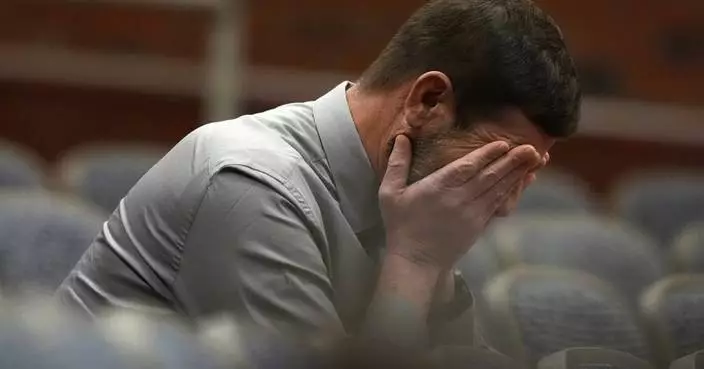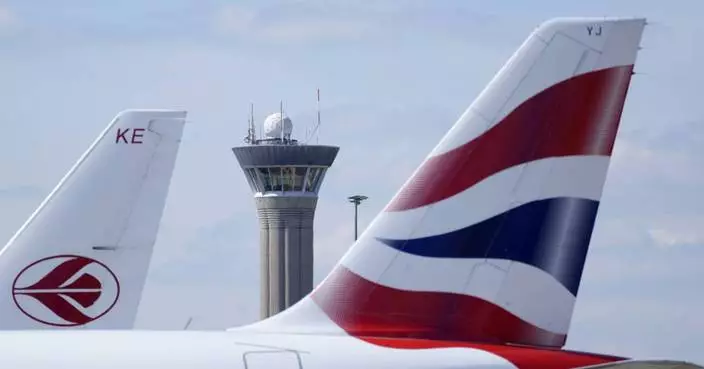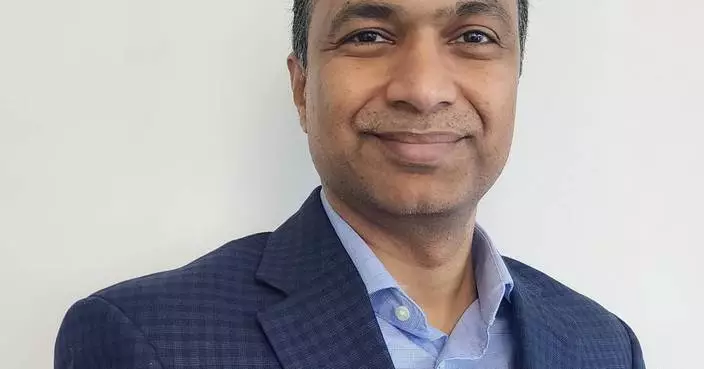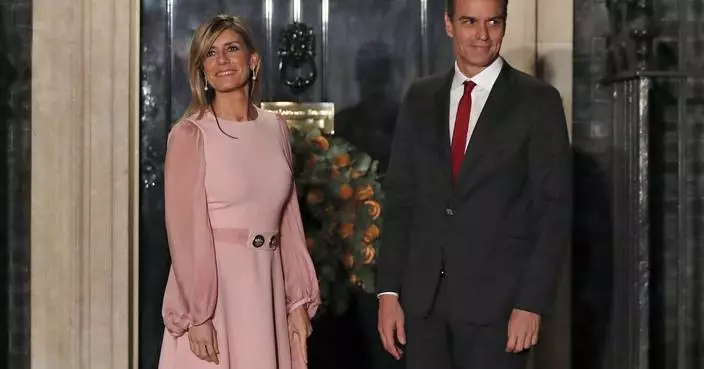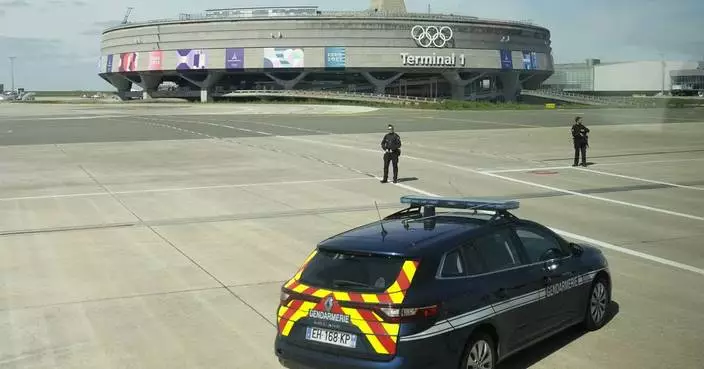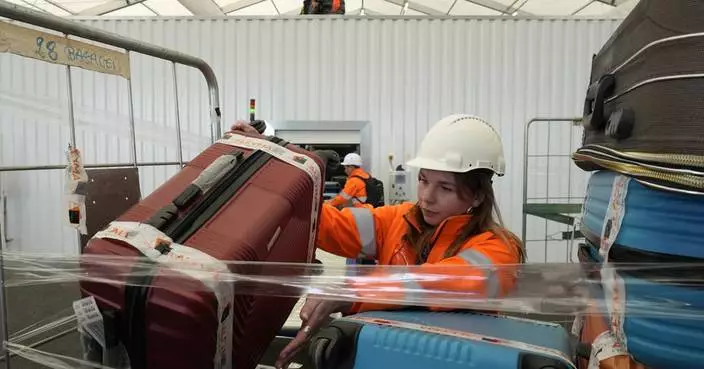A video showing one of French President Emmanuel Macron's security chiefs beating a student demonstrator, until now cloaked in secrecy, drew fierce public backlash Thursday over what is seen as mild punishment and a possible cover-up.
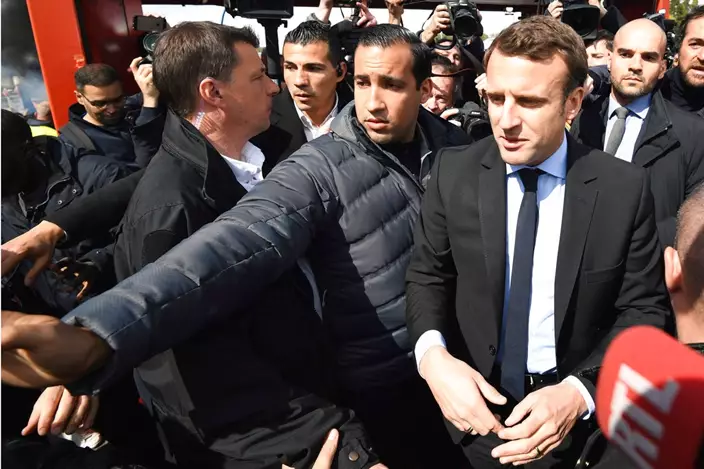
FILE - In this Wednesday April 26, 2017 file photo French centrist presidential election candidate Emmanuel Macron, flanked by his bodyguard, Alexandre Benalla, left, arrives outside the Whirlpool home appliance factory, in Amiens, northern France. Benalla, an aide to President Emmanuel Macron, charged with security, has been seen in a video wearing a police helmet and beating up a student protester in May, reigning criticism on Macron notably due to the light punishment _ a two-week suspension. (Eric Feferberg/Pool via AP, File)
The video of the May 1 event in Paris, revealed by Le Monde on Wednesday evening, shows Alexandre Benalla in a helmet with police markings, and surrounded by riot police, brutally dragging off a woman from a demonstration and then repeatedly beating a young man on the ground. The man is heard begging him to stop. Another man in civilian clothing pulled the young man to the ground.
Click to Gallery
A video showing one of French President Emmanuel Macron's security chiefs beating a student demonstrator, until now cloaked in secrecy, drew fierce public backlash Thursday over what is seen as mild punishment and a possible cover-up.
The video of the May 1 event in Paris, revealed by Le Monde on Wednesday evening, shows Alexandre Benalla in a helmet with police markings, and surrounded by riot police, brutally dragging off a woman from a demonstration and then repeatedly beating a young man on the ground. The man is heard begging him to stop. Another man in civilian clothing pulled the young man to the ground.
The uproar over Benalla's punishment — a two-week suspension and a change in responsibilities — upended regular business in parliament with lawmakers aghast that the security official still has an office in the presidential palace two-and-a-half months after the incident, and that he was not immediately reported to judicial authorities.
But Macron has remained silent about a man he knows well. Benalla, who hasn't commented on the matter, handled Macron's security during the presidential campaign.
Authorities belatedly launched a preliminary investigation that could lead to charges against Benalla, a judicial official said on condition of anonymity because he wasn't authorized to discuss an ongoing case.
Roger-Petit said the punishment dealt out to Benalla was the "most serious" ever given to a top aide at the presidential Elysee Palace and served as a "last warning before dismissal."
Police, who had hauled the man from the crowd before Benalla took over, didn't intervene. Benalla then left the scene. The second man was apparently a gendarme in the reserves who Le Monde said had worked with Benalla in the past.
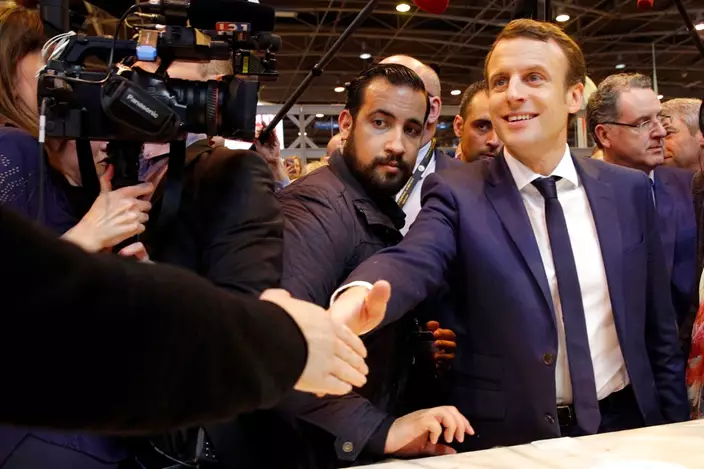
FILE - In this March 1, 2017 file picture centrist presidential candidate Emmanuel Macron, center, flanked by his bodyguard, Alexandre Benalla, left, visits the Agriculture Fair in Paris, Wednesday, March 1, 2017. Benalla an aide to President Emmanuel Macron, charged with security, has been seen in a video wearing a police helmet and beating up a student protester in May, reigning criticism on Macron notably due to the light punishment _ a two-week suspension. (AP Photo/Christophe Ena, File)
The uproar over Benalla's punishment — a two-week suspension and a change in responsibilities — upended regular business in parliament with lawmakers aghast that the security official still has an office in the presidential palace two-and-a-half months after the incident, and that he was not immediately reported to judicial authorities.
A preliminary investigation was hastily opened Thursday as the tempo of outrage swelled.
"I'm surprise he hasn't resigned," said conservative lawmaker Jean-Christophe Lagarde, adding that if Benalla doesn't do so himself, the president should remove him or the drama will jump to "an affair of state."
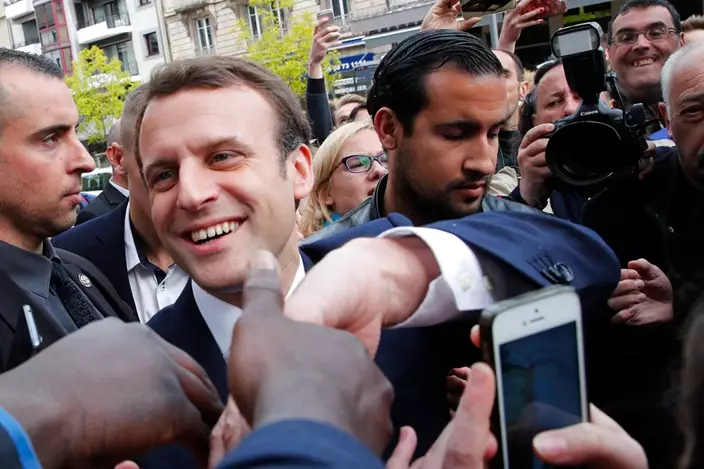
FILE - In this Friday, May 5, 2017 file photo French independent centrist presidential candidate Emmanuel Macron, flanked by his bodyguard, Alexandre Benalla, right, shakes hands with supporters as he campaigns in Rodez, southern France. Benalla, an aide to President Emmanuel Macron, charged with security, has been seen in a video wearing a police helmet and beating up a student protester in May, reigning criticism on Macron notably due to the light punishment _ a two-week suspension. (AP Photo/Christophe Ena, File)
But Macron has remained silent about a man he knows well. Benalla, who hasn't commented on the matter, handled Macron's security during the presidential campaign.
Prime Minister Edouard Philippe, responding to questions in the Senate, called the video images "shocking," but stumbled to respond to questions, notably whether all French are equal before the law.
Interior Minister Gerard Collomb said that the two men tackling the young protester "obviously had no legitimate (reason) to intervene." He said he has demanded that a police unit which investigates suspected criminal behavior by officers explain the rules governing observers and verify whether they were respected.
Condemning the "unacceptable behavior," Macron spokesman Bruno Roger-Petit said that Benalla was also removed from his responsibilities of organizing security for presidential trips — though he maintains his office at the Elysee Palace.
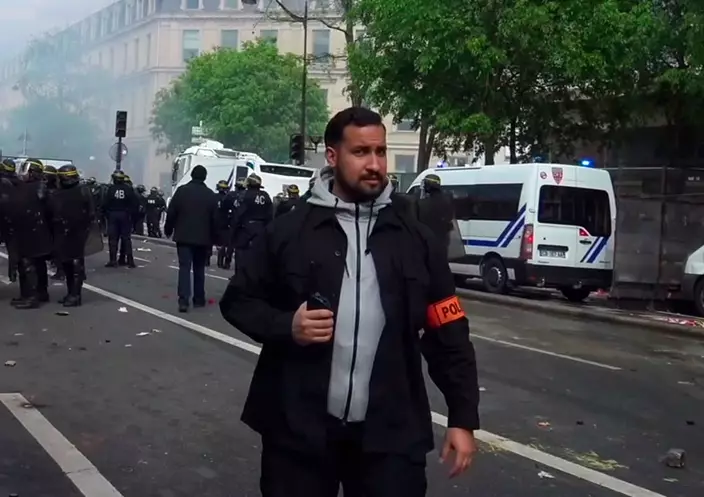
In this grab taken from video on May 1, 2018 provided by Clemont Lanot, French security chief Alexandre Benalla patrols during clashes with activists on the sidelines of the traditional May Day rally, in Paris France. A video showing one of French President Emmanuel Macron's security chiefs beating a student demonstrator in May, until now cloaked in secrecy, is drawing a fierce public backlash over what is seen as mild punishment - a two week suspension and a change in responsibility. (Clemont Lanot via AP)
Authorities belatedly launched a preliminary investigation that could lead to charges against Benalla, a judicial official said on condition of anonymity because he wasn't authorized to discuss an ongoing case.
Despite his official change to a desk job, Benalla was seen this month on the ground with police at several high-profile events, including the return home Monday of France's champion World Cup team, an event attended by hundreds of thousands.
Macron, in the Dordogne region to officially launch a new postage stamp, didn't respond to questions about the scandal. The upstart centrist elected last year had promised an exemplary presidency during his term to break with unending cases of corruption in French politics.
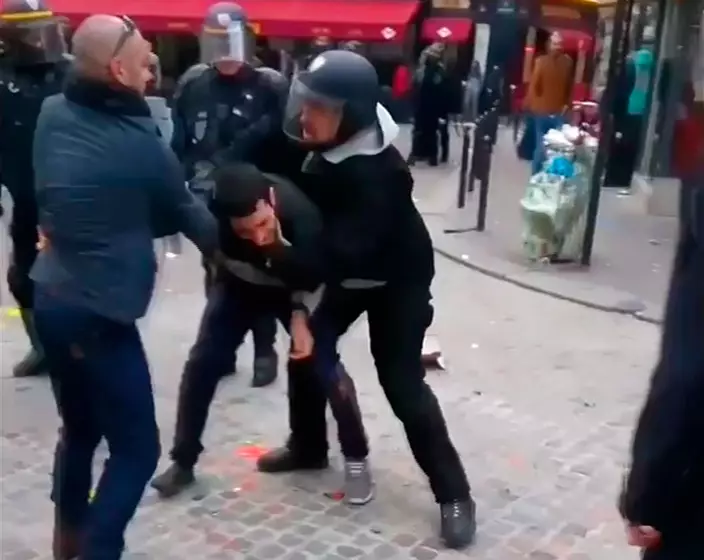
In this image taken from video, a man identified as Alexandre Benalla, right, a security chief to French President Emmanuel Macron, confronting a student during a May Day demonstration in Paris, May 1, 2018. The video came to light Thursday July 19, 2018, showing one of Macron's security chiefs beating a student demonstrator, until now cloaked in secrecy, and is drawing a fierce public backlash over what is seen as mild punishment of a two-week suspension, and a possible cover-up. (Nicolas Lescaut via AP)
Roger-Petit said the punishment dealt out to Benalla was the "most serious" ever given to a top aide at the presidential Elysee Palace and served as a "last warning before dismissal."
Opposition politicians denounce a climate of impunity at the top of the French political hierarchy.
The head of France's main conservative party The Republicans, Laurent Wauquiez, asked on Europe 1 radio if the government was trying to "hush the affair."
"The feeling is that at the Elysee people think they're above everything," Wauquiez said.
Roger-Petit, the presidential spokesman, stressed that Benalla had requested authorization to use his day off "to observe" security forces' operations on May Day when marches are traditionally held. It was granted.
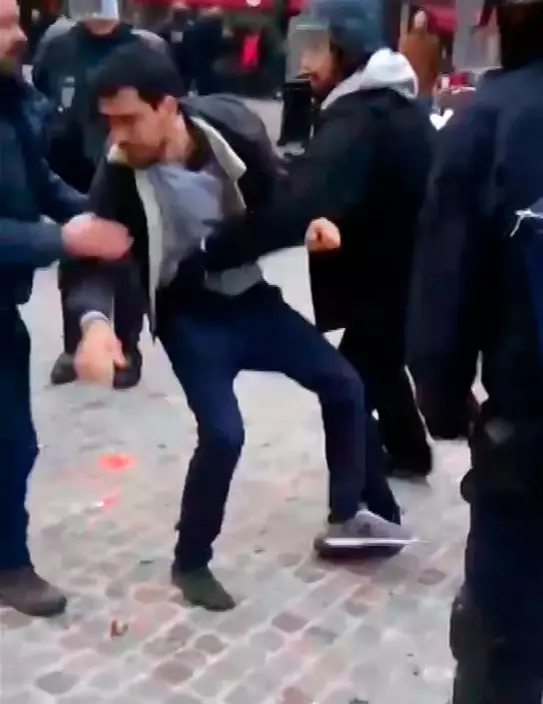
In this image taken from video, a man identified as Alexandre Benalla, right, a security chief to French President Emmanuel Macron, confronts a student during a May Day demonstration in Paris, May 1, 2018. The video came to light Thursday July 19, 2018, showing one of Macron's security chiefs beating a student demonstrator, until now cloaked in secrecy, and is drawing a fierce public backlash over what is seen as mild punishment of a two-week suspension, and a possible cover-up. (Nicolas Lescaut via AP)
It was unclear why the young man under attack, who wasn't detained, was singled out by police before Benalla intervened.
"An observer doesn't act like that," said the spokesman for the UNSA-Police union. They are typically equipped and briefed in advance, and the framework is "completely clear," Philippe Capon told BFM-TV.
He couldn't say why police didn't stop Benalla.
The context was "special," he said. "He was an observer from the Elysee. When police officials hear the word 'Elysee' there is a particular apprehension."
WASHINGTON (AP) — The U.S. Supreme Court on Thursday took up Donald Trump's bid to avoid prosecution over his efforts to overturn his 2020 election loss to Democrat Joe Biden.
Trump’s lawyers argue that former presidents are entitled to absolute immunity for their official acts. Otherwise, they say, politically motivated prosecutions of former occupants of the Oval Office would become routine and presidents couldn’t function as the commander in chief if they had to worry about criminal charges.
Lower courts have rejected those arguments, including a unanimous three-judge panel on an appeals court in Washington. And even if the high court resoundingly follows suit, the timing of its decision may be as important as the outcome.
That’s because Trump, the presumptive 2024 Republican presidential nominee, has been pushing to delay the trial until after the November election, and the later the justices issue their decision, the more likely he is to succeed.
The court typically issues its last opinions by the end of June, which is roughly four months before the election.
Currently:
— What to listen for during Supreme Court arguments on Donald Trump and presidential immunity
— The Supreme Court will decide whether Trump is immune from federal prosecution. Here’s what’s next
— What to know in the Supreme Court case about immunity for former President Trump
— Trump is in New York for the hush money trial while the Supreme Court hears his immunity case in DC
— Follow the AP’s coverage of the U.S. Supreme Court at https://apnews.com/hub/us-supreme-court
Here's the latest:
Arguments before the U.S. Supreme Court have ended after more than 2 1/2 hours in Donald Trump’s bid to avoid prosecution over his efforts to overturn his 2020 election loss to Joe Biden.
The arguments had been scheduled to last for an hour but ran more than double the allotted time.
The case delved deep into the nuances of immunity, and key questions of when the high court might rule remain unclear.
The court usually releases its opinions by the end of June, and the timing of the ruling could be as important as the outcome.
At least five justices appeared likely to reject the claim of absolute immunity, but some also suggested that former presidents might have some immunity.
If their ruling reflects that and requires lower courts to then sort out whether immunity applies to Trump, it could push the trial past the November election.
The Supreme Court justices are keenly aware their decision on whether former commanders in chief have immunity will have huge implications not just for this case, but also far beyond this prosecution.
During arguments Thursday in Donald Trump’s bid to avoid prosecution over his efforts to overturn his 2020 election loss, Justice Neil Gorsuch told special counsel team lawyer Michael Dreeben they are “writing a rule for the ages.”
Justice Brett Kavanaugh concurred, adding: “This case has huge implications for the presidency, for the future of the presidency, for the future of the country.”
Dreeben is working hard throughout the arguments to make clear that a prosecution in this case would not open the floodgates to other criminal charges against future ex-presidents.
In response to a question about drone strikes authorized by former President Barack Obama, Dreeben said the U.S. government already analyzed that fact pattern and concluded that there was “no risk of prosecution for that course of activity.”
As Supreme Court arguments over immunity for Donald Trump stretched near the two-hour mark Thursday, special counsel team attorney Michael Dreeben got to the heart of the government’s case.
He ticked through the acts Trump is charged with, including a slate to elevate fake electors in battleground states, that he said were undertaken in Trump’s status as a presidential candidate and not a president.
Dreeben did, however, note that Trump’s interactions with Justice Department officials in his administration were perhaps protected acts.
The justices appeared highly skeptical of Trump’s claims of absolute immunity, but with arguments still underway, the essential question of when they might decide the case remains unclear.
The timing of their ruling could be as important as the outcome. At least five justices appeared likely to reject the claim of absolute immunity, but some also suggested that former presidents might have some immunity.
If their ruling reflects that and requires lower courts to then sort out whether immunity applies to Trump, it could push the trial past the November election. The court usually releases opinions by the end of June.
In oral arguments that have involved a lot of elevated legal jargon, the Supreme Court justices also sneaked in a few fun metaphors Thursday during Donald Trump’s bid to avoid prosecution over his efforts to overturn his 2020 election loss to Joe Biden.
Striking a skeptical note while questioning Trump lawyer D. John Sauer, Chief Justice John Roberts argued that expunging from the indictment acts that are official rather than personal would hobble the case, making it a “one-legged stool.”
Later, in conversation with special counsel team lawyer Michael Dreeben, Justice Samuel Alito brought up “the old saw about indicting a ham sandwich.” He was referring to the belief that indictments are easy to secure, and that they don’t necessarily indicate any likelihood of guilt.
Alito asked Dreeben whether he had come across a lot of cases in which a federal prosecutor wanted to indict a case and the grand jury refused. Dreeben said there are such cases, before Alito cut him off.
“Every once in a while there’s an eclipse, too,” Alito said, drawing some laughs in the courtroom.
The team under Special Counsel Jack Smith, which wrote that a lack of previous criminal charges “underscores the unprecedented nature” of what Donald Trump is accused of, is up before the Supreme Court in Trump's bid to avoid prosecution over his efforts to overturn his 2020 election loss to Democrat Joe Biden.
Michael Dreeben, a lawyer for the Smith team, said the court has never before recognized absolute immunity for a former president. “Such presidential immunity,” he said, “has no foundation in the Constitution.”
Justice Clarence Thomas asked Dreeben whether he was saying that there was no immunity even for official acts.
Dreeben said yes and also that impeachment and conviction before the Senate is not a prerequisite for a courtroom prosecution. Dreeben said there are plenty of checks to prevent politically motivated prosecutions.
Thomas said that other presidential acts in the past would have seemed ripe for prosecution and yet none occurred. Dreeben responded that the core distinction is that those other acts were not crimes.
Dreeben said the Smith team was not endorsing a system in which presidents would be exposed to prosecution for mistakes or bad judgments.
Justice Neil Gorsuch posed a line of questions Thursday that appeared friendly to arguments by Trump's lawyers in his bid to avoid prosecution over his efforts to overturn his 2020 election loss to Democrat Joe Biden.
Gorsuch suggested that if presidents fear they could be prosecuted after they leave office, they could begin preemptively pardoning themselves.
“We’ve never answered whether a president can do that. And happily, it’s never been presented to us,” he said.
But Justice Amy Coney Barrett took issue with a key argument of the Trump team — that under the Constitution, former presidents must be impeached and convicted before the Senate before they can be prosecuted in court.
Barrett said no one has ever suggested the justices would need to be impeached and convicted before they could be prosecuted. Trump lawyer D. John Sauer responded that under the Constitution, the sequence is only mandatory as it relates to former presidents.
Some Supreme Court justices posed scenarios or expressed skepticism Thursday as arguments started in Donald Trump’s bid to avoid prosecution over his efforts to overturn his 2020 election loss to Democrat Joe Biden.
Conservative Justice Samuel Alito said he considered it “implausible” that a president could legally order Navy SEALs to order the assassination of a political rival. That skepticism matters because the hypothetical is something the Trump team, which includes attorney D. John Sauer, has suggested could theoretically be protected from prosecution.
Conservative Justice Amy Coney Barrett asked Sauer a question that cut to the heart of the case, reading aloud allegations from the indictment and asking him to respond whether Trump’s actions in each instance were private or official.
Trump’s attorneys concede that immunity does not extend to personal actions but instead protects official acts. Sauer said he believed most of the acts are unquestionably official.
Chief Justice John Roberts, who could be a key swing vote, struck a skeptical note about the idea of expunging from the indictment acts that are official rather than personal, saying such a move would render the case a “one-legged stool.”
Liberal Justice Ketanji Brown Jackson said Sauer was asking for a change in the immunity law. She raised Richard Nixon’s pardon, asking, “I think that if everybody thought that presidents couldn’t be prosecuted, then what was that about?"
Liberal Justice Elena Kagan noted the Founding Fathers did not insert an immunity clause for presidents into the Constitution — but, she said, “they knew how to.”
Supreme Court Justice Clarence Thomas pressed Donald Trump's lawyer D. John Sauer at the outset of arguments Thursday, asking where the principle of absolute immunity comes from.
The question was the first during arguments at the Supreme Court in Trump’s bid to avoid prosecution over his efforts to overturn his 2020 election loss to Democrat Joe Biden.
Sauer fell back quickly on a Supreme Court case that’s core to the defense — a 1982 decision that held that former presidents are immune from civil lawsuits.
A skeptical Justice Sonia Sotomayor pointedly noted to Sauer that the indictment alleges that Trump acted for personal gain.
She said the Founding Fathers had contemplated the idea of immunity for presidents but had explicitly decided against it.
She made clear her opposition to the Trump legal team’s position, saying she was having a hard time envisioning immunity for a president who creates and submits false documents, orders the assassination of a political rival, and any number of other criminal acts.
First up on Thursday was D. John Sauer, making Donald Trump’s argument that he’s immune from criminal prosecution. A former Missouri solicitor general and onetime Supreme Court clerk, Sauer also represented Trump at the appeals court level.
Trump went to those arguments even though he wasn’t required to be there, but he won’t be in the audience at the Supreme Court today. He’s required to be in New York for his hush money trial.
About 30 demonstrators gathered outside the Supreme Court before arguments, some wearing judicial robes with kangaroo masks and others holding signs like “Justice Delayed Is Justice Denied.” That’s an apparent reference to the the timing of the high court’s ultimate decision in the case, which could determine whether a trial can be held before the election in November.
Shortly before arguments were slated to begin, Trump fired off a few posts Thursday on his social media network.
In one, he declared in all caps, “WITHOUT PRESIDENTIAL IMMUNITY, IT WOULD BE IMPOSSIBLE FOR A PRESIDENT TO PROPERLY FUNCTION, PUTTING THE UNITED STATES OF AMERICA IN GREAT AND EVERLASTING DANGER!”
Trump also said that without immunity, a president would just be “ceremonial” and the opposing political party “can extort and blackmail the President by saying that, ‘if you don’t give us everything we want, we will Indict you for things you did while in Office,’ even if everything done was totally Legal and Appropriate.”
Of the nine justices hearing the case, three were nominated by Trump — Amy Coney Barrett, Neil Gorsuch and Brett Kavanaugh. But it’s the presence of a justice confirmed decades before Trump’s presidency, Justice Clarence Thomas, that’s generated the most controversy.
Thomas’s wife, Ginni Thomas, urged the reversal of the 2020 election results and then attended the rally that preceded the Capitol riot. That has prompted calls for the justice to step aside from several court cases involving Trump and Jan. 6.
But Thomas has ignored the calls, taking part in the unanimous court decision that found states cannot kick Trump off the ballot as well as last week’s arguments over whether prosecutors can use a particular obstruction charge against Capitol riot defendants.
The justices will probably meet in private a short time after arguments to take a preliminary vote on the outcome. Chief Justice John Roberts would be a prime candidate to take on the opinion for the court, assuming he is in the majority.
They could simply reject Trump’s immunity claim outright, permitting the prosecution to move forward and returning the case to U.S. District Judge Tanya Chutkan to set a trial date.
They could also reverse the lower courts by declaring for the first time that former presidents may not be prosecuted for conduct related to official acts during their time in office. Such a decision would stop the prosecution in its tracks.
There are other options, too, including ruling that former presidents do retain some immunity for their official actions but that, wherever that line is drawn, Trump’s actions fall way beyond it.
Yet another possibility is that the court sends the case back to Chutkan with an assignment to decide whether the actions Trump is alleged to have taken to stay in power constitute official acts.
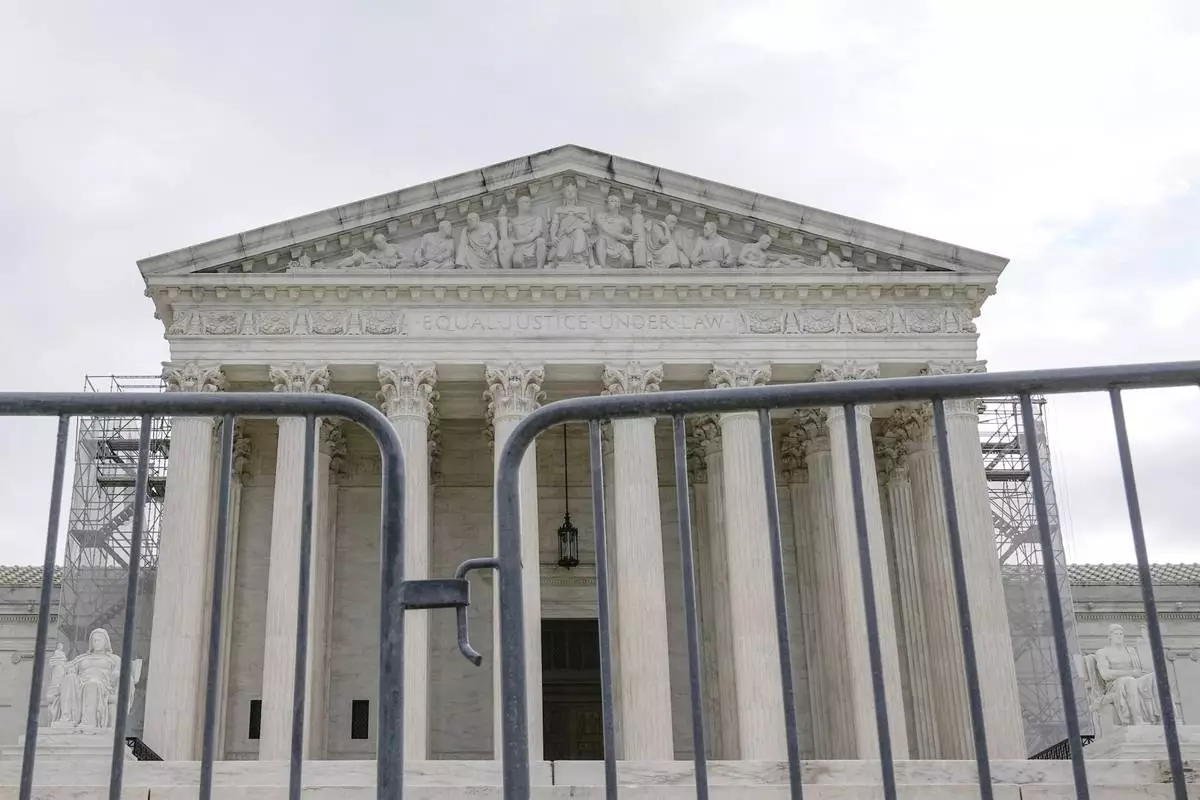
The Supreme Court is seen during a protest outside the as the justices prepare to hear arguments over whether Donald Trump is immune from prosecution in a case charging him with plotting to overturn the results of the 2020 presidential election, on Capitol Hill Thursday, April 25, 2024, in Washington. (AP Photo/Mariam Zuhaib)
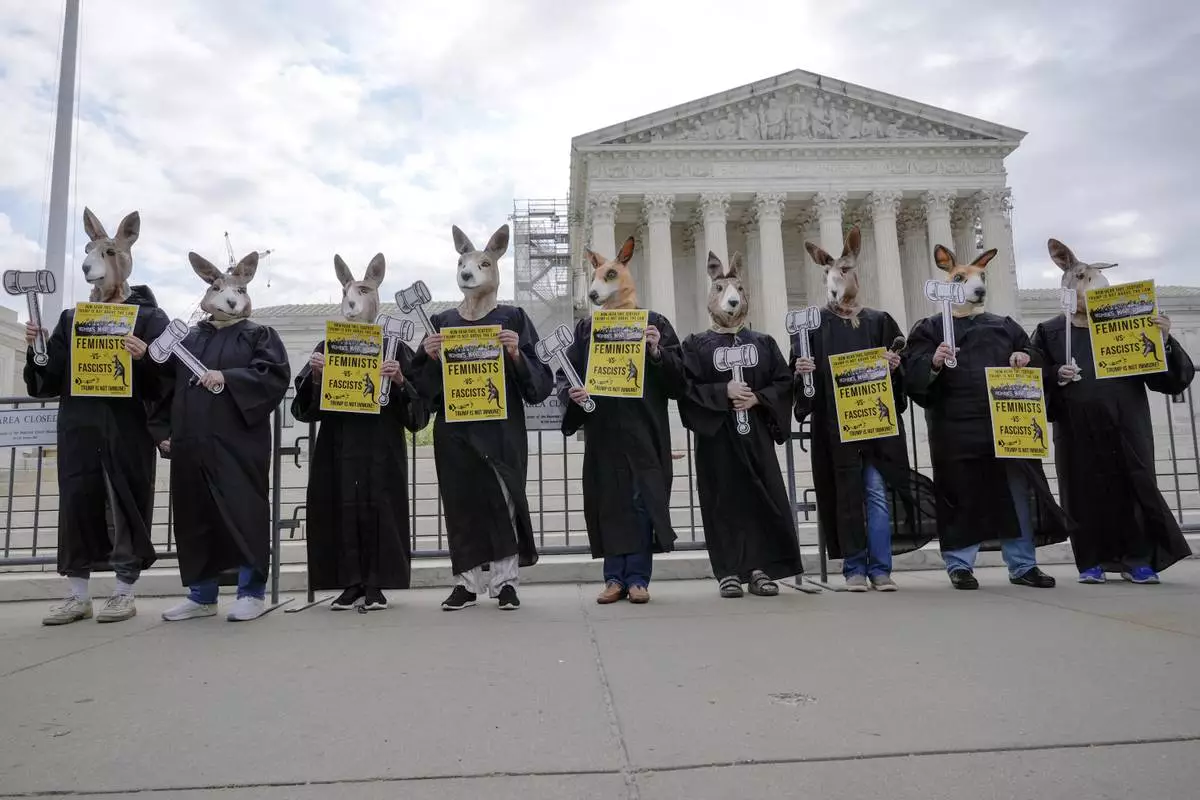
Demonstrators stand outside the Supreme Court as the justices prepare to hear arguments over whether Donald Trump is immune from prosecution in a case charging him with plotting to overturn the results of the 2020 presidential election, on Capitol Hill Thursday, April 25, 2024, in Washington. (AP Photo/Mariam Zuhaib)
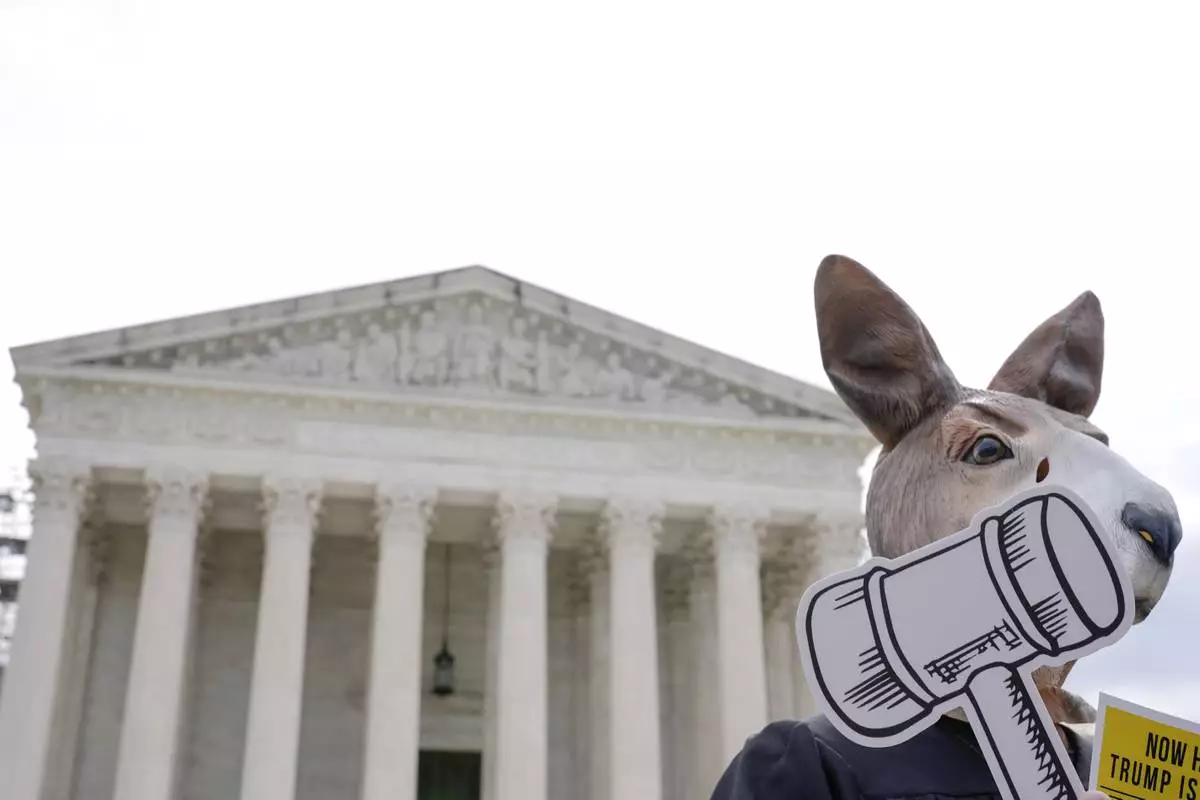
A demonstrator stands outside the Supreme Court as the justices prepare to hear arguments over whether Donald Trump is immune from prosecution in a case charging him with plotting to overturn the results of the 2020 presidential election, on Capitol Hill Thursday, April 25, 2024, in Washington. (AP Photo/Mariam Zuhaib)
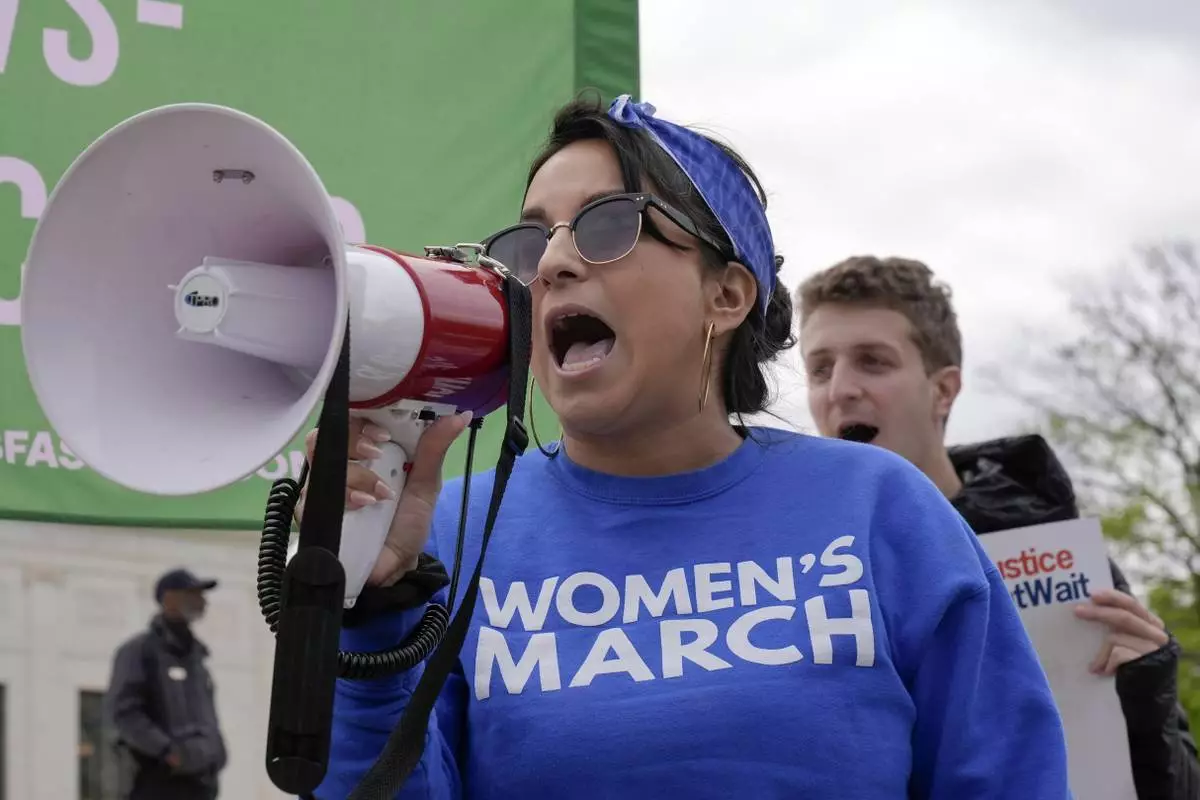
Demonstrators protest outside the Supreme Court as the justices prepare to hear arguments over whether Donald Trump is immune from prosecution in a case charging him with plotting to overturn the results of the 2020 presidential election, on Capitol Hill Thursday, April 25, 2024, in Washington. (AP Photo/Mariam Zuhaib)
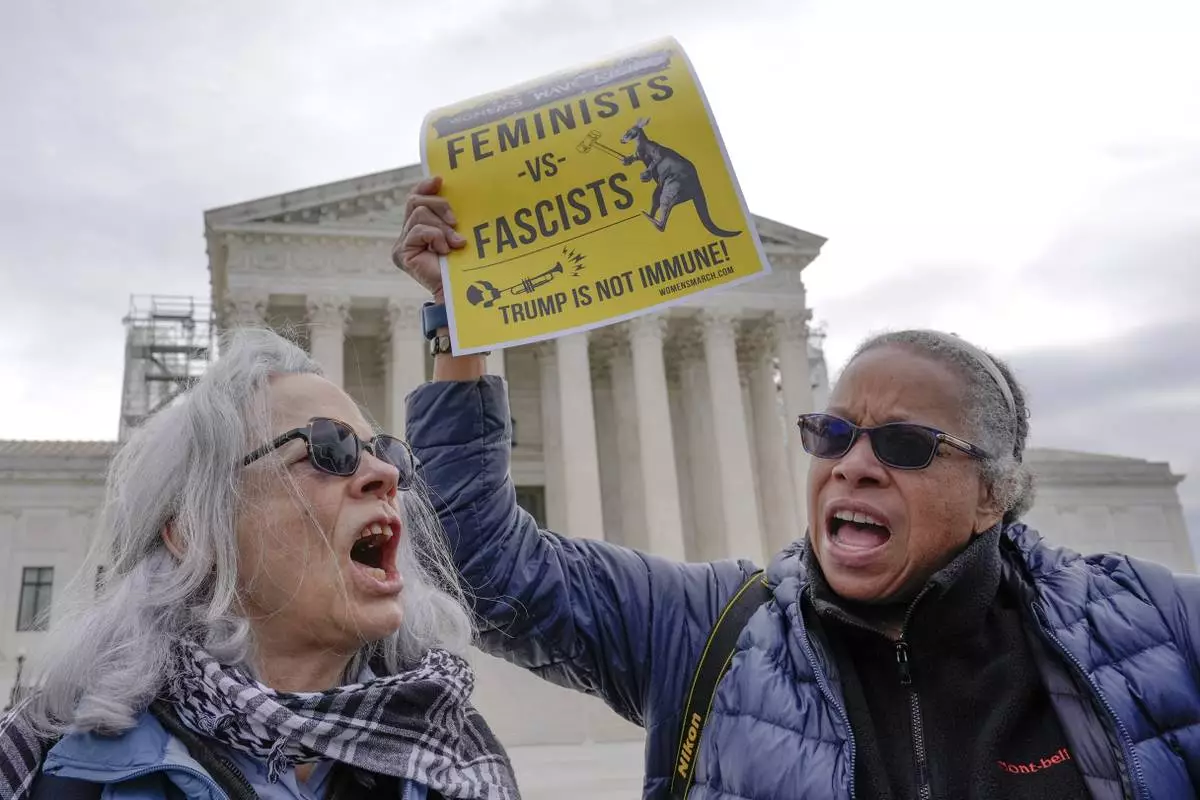
Demonstrators protest outside the Supreme Court as the justices prepare to hear arguments over whether Donald Trump is immune from prosecution in a case charging him with plotting to overturn the results of the 2020 presidential election, on Capitol Hill Thursday, April 25, 2024, in Washington. (AP Photo/Mariam Zuhaib)
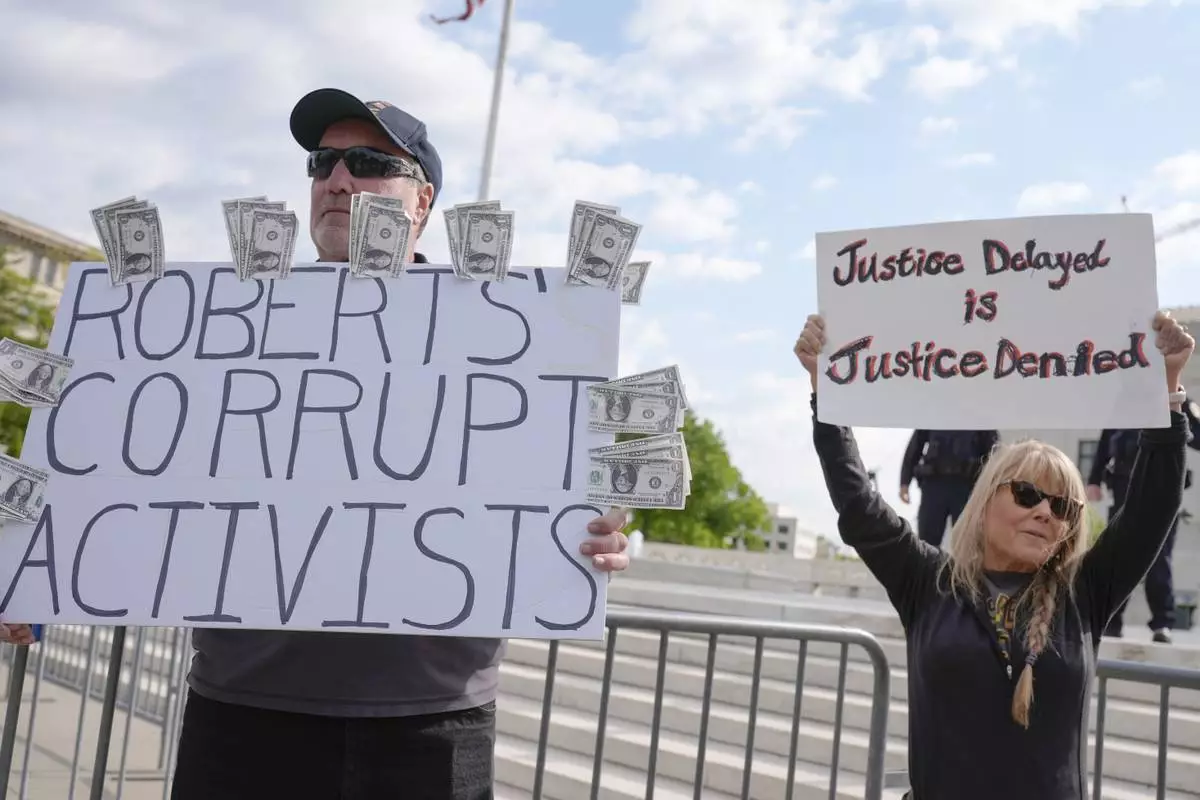
Demonstrates stand outside the Supreme Court as the justices prepare to hear arguments over whether Donald Trump is immune from prosecution in a case charging him with plotting to overturn the results of the 2020 presidential election, on Capitol Hill Thursday, April 25, 2024, in Washington. (AP Photo/Mariam Zuhaib)
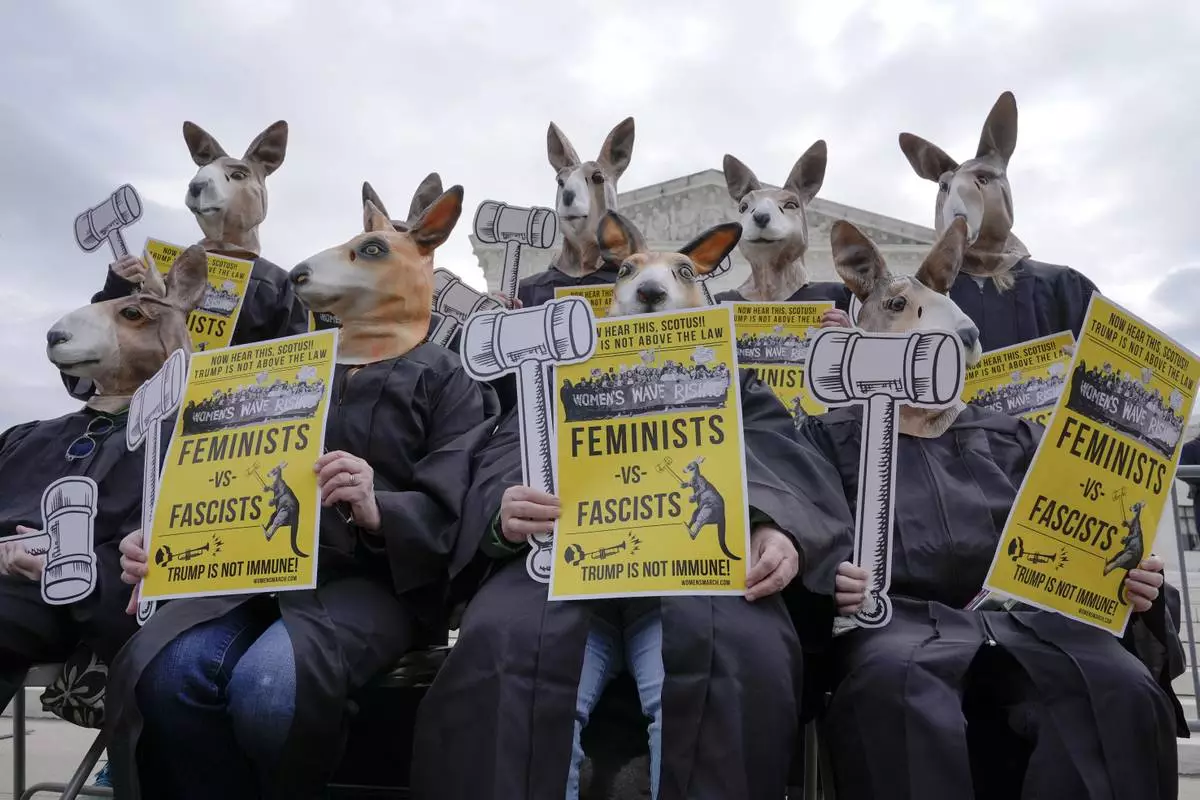
Demonstrates stand outside the Supreme Court as the justices prepare to hear arguments over whether Donald Trump is immune from prosecution in a case charging him with plotting to overturn the results of the 2020 presidential election, on Capitol Hill Thursday, April 25, 2024, in Washington. (AP Photo/Mariam Zuhaib)
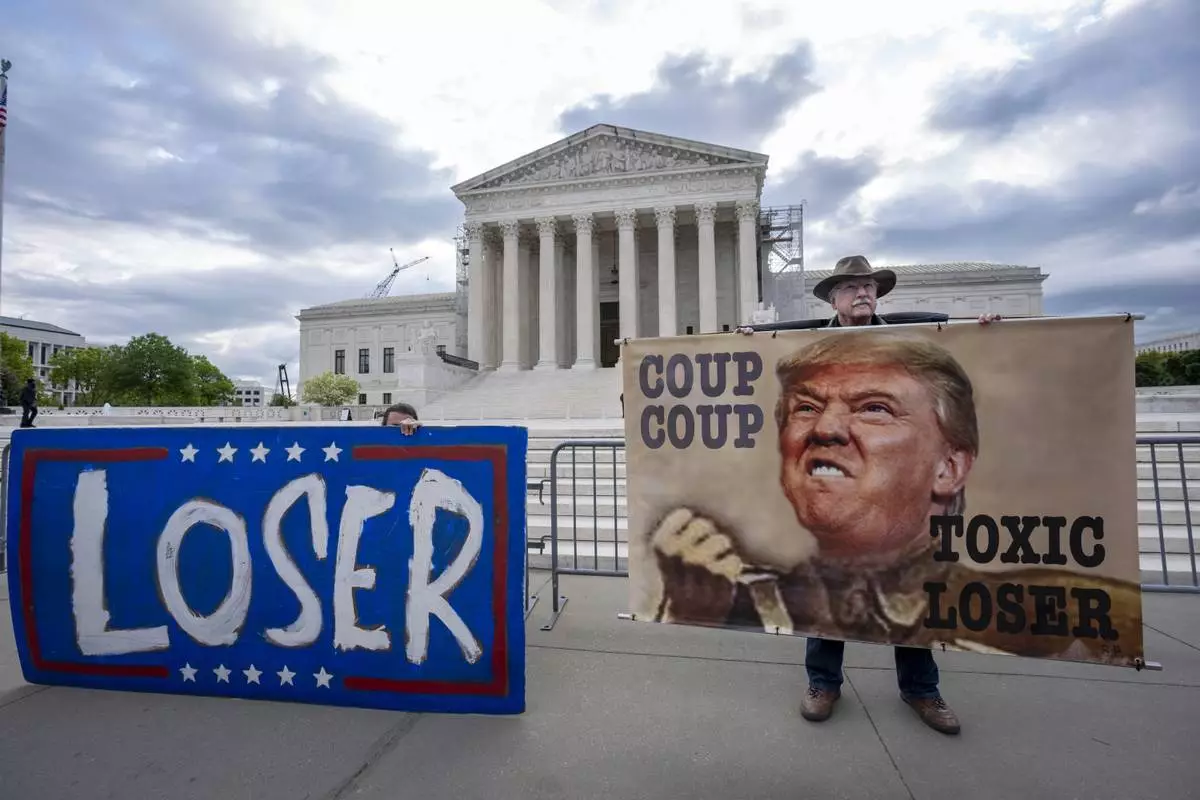
Activist Stephen Parlato of Boulder, Colo., right, joins other protesters outside the Supreme Court as the justices prepare to hear arguments over whether Donald Trump is immune from prosecution in a case charging him with plotting to overturn the results of the 2020 presidential election, on Capitol Hill in Washington, Thursday, April 25, 2024. (AP Photo/J. Scott Applewhite)


















